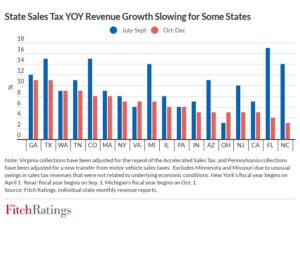State tax revenues start to soften, review finds
Collections have fallen in California, Massachusetts and New York, Fitch Ratings found.
Tax collections are still beating lawmakers’ expectations halfway through most states’ fiscal 2023, but revenue growth is starting to slow, according to a Fitch Ratings review of 18 states.
As states put together their budgets for this fiscal year, “we will be looking to see how cautiously states are forecasting their revenues for the future and how states are using their surpluses,” said Tammy Gamerman, director of U.S. public finance for Fitch Ratings.
Federal Covid-19 relief aid, inflation, and a strong economy have all contributed to eye-popping revenue growth and huge state surpluses over the last two fiscal years. Although tax collections are still rising, they’re not rising as quickly as they did last year and the year before.
Total tax collections in the 18 states Fitch analyzed are up almost 6% on average so far compared to last fiscal year, the credit rating agency found in a commentary published Tuesday.
Collections have fallen in California, Massachusetts and New York, Fitch found, driven by declines in income tax payments. “They all heavily rely on high-income earners,” Gamerman said of those states. As the stock market has struggled, wealthy people have earned less in capital gains, bonuses and other income.
All three states also have changed how pass-through entities are taxed, which has muddied the tax data, Gamerman said.
Sales tax revenue growth has slowed in recent months along with the rate of inflation, Fitch found. The credit rating agency expects sales tax revenue growth to slow further as people spend down their savings and inflation cools.

Most states are prepared for economic growth to slow. State leaders have built up enormous rainy-day funds over the past few years, money that will help them continue to pay the bills if the economy does enter a recession.

